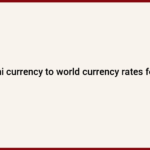Russian Raiffeisen Bank will stop cross-border transfers from leaving Russia in any foreign currency, the bank reported in its Aug. 15 press release. This means that Russian citizens will be unable to transfer cash in foreign currency from Russia to any other country using Raiffeisen Bank.
They will still have time to make payments as the new regime will not take effect until Sept. 2, 2024. “We try to give you as much advance notice as possible, given the ever-changing market conditions. Currency payments, properly completed and accepted by the bank for execution before 16:00 Moscow time on Aug. 30, 2024, will be executed under the current terms and restrictions,” the bank’s statement said.
JOIN US ON TELEGRAM
Follow our coverage of the war on the @Kyivpost_official.
A limited number of corporate clients in large and international businesses will still be able to transfer payments in foreign currency, but not a retail customer.
However, Russian citizens can still transfer cash through cross-border payments using rubles, “to countries that accept them.”
The European Central Bank (ECB) has been putting pressure to cut Raiffeisen’s loans and payments business in Russia, Reuters previously reported.
The Russian subsidiary of the Austrian bank decided to restrict the payments following a decision made by the Raiffeisen Bank International (RBI) Group “in response to an ECB directive.”
Last safe haven

Other Topics of Interest
Ukrainian Authors Comprise One-Third of Bestsellers Bought by Ukrainian Refugees
Ukraine’s largest offline retailer Knyharnya Ye sees it as a sign Ukrainians do not want to give up connections with Ukrainian culture abroad.
For more than two years following the start of sanctions against Russia, Raiffeisen Bank remained the leading bank for foreign currency transactions abroad among Russian banks and Western subsidiaries.
The other two global banks in Russia – Citibank and UniCredit – could transfer cash abroad but did not run the process smoothly. Citibank stopped opening bank accounts in foreign currency and rubles, UniCredit charges new clients with premium tariffs of almost $11 per month.
“Raiffeisen bank is the easiest way to transfer money abroad,” Russian media T-ZH wrote when giving advice to Russians how to transfer money abroad in the face of sanctions.
Most Russian banks are under European and American sanctions. Out of 321 banks in Russia, the US imposed sanctions against 66 banks and the national payment system MYR.
In March 2022, Visa, Mastercard and American Express also announced that they suspended all operations in Russia in protest of its invasion of Ukraine.
Raiffeisen Bank was one of the financial institutions that did not withdraw from Russia, serving 2,600 corporate customers, four million account holders and 10,000 staff in Russia.





















